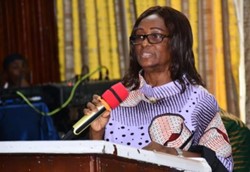The National Elections Commission (NEC) of Liberia has recently dismissed a number of employees who participated in protests alleging unpaid benefits, which have persisted for over a month. Despite the exact number of dismissed individuals remaining unspecified, their grievances focused on outstanding insurance benefits and salary arrears, some of which date back up to twelve months. The demonstrations intensified during the period from November 12 to 24, when workers obstructed the Commission’s entrance, impeding the Chairperson, Madam Davidetta Browne-Lansanah, from carrying out her responsibilities effectively.
The protests arose from discontent over management practices within the NEC, with the workers accusing leadership of failing to meet financial obligations, including hazard allowances and insurance payments. In response to the unrest, NEC’s Human Resource Director, Pauline G. Korkoyah, issued a communication on December 2, 2024, announcing the immediate dismissal of those involved. The letter cited “gross insubordination” and noted that the actions of the protesting employees had severely hampered the Commission’s operations, ultimately tarnishing its reputation. All dismissed employees have been ordered to return any NEC property that they have in their possession.
Chairperson Madam Browne-Lansanah rejected the protesters’ claims, insisting that all outstanding payments had been settled in accordance with the 2023 budget allocations. This rebuttal highlights a significant rift between NEC leadership and its employees, who feel that their needs and concerns about financial benefit discrepancies have not been adequately acknowledged or addressed. The situation reflects broader issues within governmental institutions regarding employee treatment, financial management, and communication between different levels of an organization.
The Commission’s official statement delivered via HR Director Korkoyah detailed the reasons for the dismissals and the necessity of disciplinary action in light of the protests’ disruptive effects. Specific claims of disrespect and obstruction were cited as justifications for the firings which aimed to restore order and normalcy to the Commission’s operations. Despite the employees’ grievances revolving around legitimate concerns regarding pay and benefits, the NEC’s response indicates a lack of willingness to negotiate or address these issues collaboratively.
The decision to dismiss protesting employees raises questions about the NEC’s internal management strategies and whether the leadership can effectively resolve conflicts in a manner that satisfies the workforce while maintaining operational integrity. It is evident that the dispute has the potential to escalate further if there is no dialogue established between the leadership and the employees affected. If the NEC intends to function optimally during the electoral process, it will need to address the underlying issues that prompted the protests to avoid further disruptions.
Overall, the conflict between NEC leadership and protesting employees signals pressing challenges within Liberia’s electoral management framework. The neglect of employee welfare can not only lead to fragile internal dynamics but also risks impairing the Commission’s ability to conduct free and fair elections. Moving forward, it would be prudent for the NEC to engage in constructive discussions with staff to prevent future grievances and ensure operational efficiency, especially considering the critical nature of their responsibilities in overseeing national elections.














